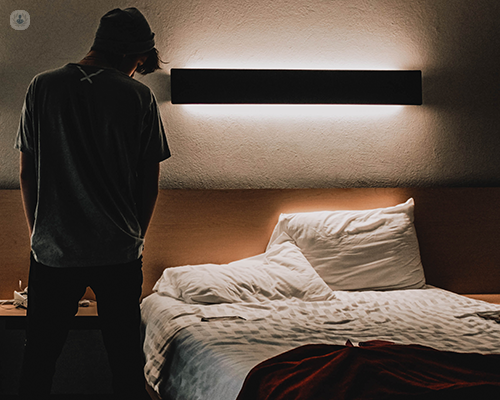Nocturnal enuresis (adult bedwetting)
Professor Rakesh Heer - Urology
Created on: 11-05-2019
Updated on: 03-21-2023
Edited by: Aoife Maguire

What is nocturnal enuresis (adult bedwetting)?
Nocturnal enuresis (adult bedwetting) is the involuntary action of urinating at night, but after the age where bladder control is well established. It can be a symptom of several underlying conditions.
Prognosis
If the bedwetting is a one-time occurrence or is very occasional, you likely don’t need to worry. However, if it happens often and/or you’re becoming worried about the bedwetting, seek medical help. Adult bedwetting has several causes and resolving bedwetting generally involves treating the underlying cause.
Medical tests to diagnose nocturnal enuresis (adult bedwetting)
Your doctor will take your medical history. You can keep a diary of your frequency of bedwetting accidents, how much you urinate, how much liquid you drink and if you have any other symptoms to provide your doctor with valuable information.
You might undergo one or more of the following tests:
- Urinalysis
- Urine culture
- Ultrasound of kidneys and bladder
- Neurological examination
- Urological examination
Causes
Adult bedwetting has several causes, including:
- overactive bladder
- medications, such as specific insomnia mediations
- stress
- structural problems inside the urethra, prostate or pelvis e.g. obstructions caused by tumours or kidney stones
- having a small bladder
- hormonal issues
- uncontrolled diabetes
- neurological disorders
Can it be prevented?
If there is an underlying cause such as a small bladder, neurological, obstructions, etc. then there is very little you can do to prevent it. However, patients with diabetes can reduce the likelihood of bedwetting by managing their condition.
The frequency of bedwetting can be reduced by reducing liquid intake before sleeping, cutting out caffeine and alcohol and you can set an alarm during the night to urinate.
Treatment for nocturnal enuresis (adult bedwetting)
Adult bedwetting treatment looks to treat the underlying cause. Treatment can also involve:
- Making certain lifestyle changes (e.g. reducing fluid intake before bed)
- Taking medication
- Having surgery – this is considered when non-invasive means have been exhausted
Which type of specialist treats it?
A specialist in urology can treat nocturnal enuresis (adult bedwetting) and the conditions that cause it.
